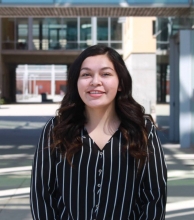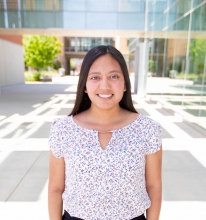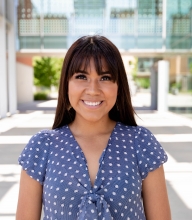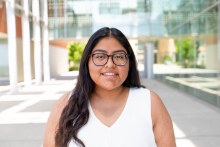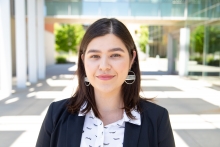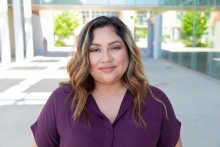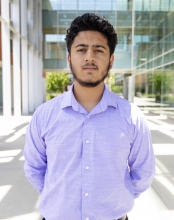Akhirah Bey
 |
Major: Psychology
Home City: Oakland, CA
Contact: abey2@ucmerced.edu
Faculty Mentor: Tanya Golash-Boza
|
Akhirah Bey is an upcoming third year undergraduate student from Oakland, CA. Expected to graduate is 2021 with a BS in Psychology, Akhirah has begun to make a name for herself at the University of California, Merced by conducting research and being and active member in her community. In order to destress, Akhirah finds herself doing something active and listening to music. She aspires to go to Grad School for a masters in Clinical Psychology then Medical School to one day become a Psychiatrist in her own private practice.
The Collateral Consequences of Deportation and Incarceration
Akhirah Bey, and Tanya Golash-Boza, PhD; School of Social Sciences, Humanities, and Arts, University of California, Merced
Researchers have shown the negative effects of incarceration on the individual incarcerated. However, little research has been done about the effects of incarceration on the family members of the incarcerated individual. This study will be focusing on if gender and age shape the experience of having a family member incarcerated. A total of 5 in person interviews were conducted with individuals who have an immediate family member who either is, or has been incarcerated. The research is in progress, with that, there are no current results. When the results are gathered, the information obtained will be used to highlight the different affects age and gender have on how a person reacts to the experience of an immediate family member being incarcerated.
Nidia Burgos
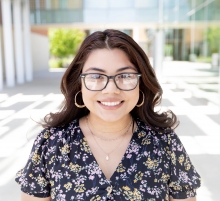 |
Major: Sociology
Home City: Oakland, CA
Contact: nburgos@ucmerced.edu
Faculty Mentor: Tanya Golash-Boza
|
Nidia Burgos is a rising fourth-year student from Oakland, CA. She is a first-generation college student and is expected to graduate from UC Merced in the Spring of 2020 with a BA in Sociology and a minor in English. One of her academic goals is that she wants to go to graduate school to obtain her Ph.D. in order to be a professor and conduct research on her own. She also wants to go back to Oakland and give back to her community in any way she can. In order to achieve this goal, she will be conducting research this summer with Professor Golash- Boza. In this research, she will be interviewing families who have had a family member who has been deported and learning what the effects/ consequences of that can do to a family. One of her major accomplishments this year was that she was able to work through her scholarship in a program called CREWS where she was able to mentor and be a resource to first generation freshman from Oakland who attend UC Merced. Through this experience, she learned a lot about herself and it was an experience that she would do again.
The Consequence of Deportation through the Eyes of Latinx Women
Nidia J. Burgos, Yjaira Ceciliano Navarro, MA, and Tanya Golash-Boza, PhD; School of Social Sciences, Humanities, and Arts, University of California, Merced
As deportation is a recurring phenomenon the consequences it has on the family challenges them: mentally, physically, and financially. The study examines the effects of deportation on families when a family member is deported. Through a qualitative method involving in depth interviews, this study will interview five different families in California, who will discuss the obstacles they faced when their family member was deported. Specifically focusing on Latinx women and their experiences. Findings suggest, that the struggles that a family goes through the most is the financial and mental stress it has on the family whose family member was deported. Furthermore, some of these consequences women face is taking on more roles when their family member was deported, nevertheless when women or men get deported women take on more responsibilities and are seen to be more active. Thus, making it harder for women to receive help and take care of themselves but also, it’s difficult for the family to succeed and maintain stability in their own family.
Mayra Cordova
Mayra Cordova is a fourth year undergraduate from Santa Paula, CA. Expected to graduate in Spring 2020 with her Bachelors of Arts in Sociology, Mayra has begun making her mark at the University of California, Merced. As an active member of Alpha Phi Omega, she spends her time volunteering in the Merced community and on campus. On her free time you can find Mayra watching youtube videos or spending time with her family. Upon graduation, Mayra hopes to pursue her MA in Marriage and Family Therapy and after gaining experience in the field she hopes to pursue a PhD. Mayra aspires to give back to her community by advocating to break the stigma around mental health in underrepresented communities. Her ultimate goal is to encourage minority students to pursue higher education and speak up about their experiences regarding mental health.
Beyond the Deportation: Experiences and Life After Deportation for the Family Members of Deportees
Mayra Cordova, Yajaira Ceciliano Navarro, MA, and Tanya Golash-Boza, PhD; School of Social Sciences, Humanities, and Arts, University of California, Merced
The topic of deportation and its affects has become more widespread in recent years with the political climate the United States is currently facing. Individuals are becoming more aware of what happens in the case of family separations leading to a rise in mobilizations to keep families together. While previous research has focused on the experiences of deportees, this study builds on the research regarding how deportation affects the families left behind immediately after the deportation and the challenges they continue to face. Through a series of five interviews with adolescent womxn, this study was able to create a narrative providing insight on the experiences of deportation on family members of deportees. Through an analysis of each interview, three common themes occurred: 1) emotional trauma and difficulties, 2) pressure on the family dynamic and 3) forced responsibility. Deportations will continue to harm families but it’s important to give individuals with these experiences a platform to share their stories and educate others on the lasting affects it creates.
Aurora Fabián Valentin
Aurora Fabián Valentin is a fourth year undergrad majoring in Sociology and minoring in Spanish. Expected to graduate from the University of California, Merced in May 2020 with a Bachelors of Arts in Sociology. Aurora is a first generation scholar who grew up in Santa Cruz, CA were her commitment to her education and community brought many positive achievements. She hopes to get her teaching credentials and work for Aspire Public Schools were she can be a role model and resource for youth who want to pursue higher education. Aurora aspires to attend graduate school to receive her PhD in education to work with youth and give back to the community. During the summer, Aurora is going to be doing research in the Central Valley with Dr. Tanya Golash–Boza on how formerly incarcerated individuals impact the family dynamics and ways incarcerated individuals can be integrated back into society. Two of her major accomplishments are working with first generation college students were she assisted in easing their college transition and writing a research paper on the Foster Care System. She is also a member of NISC on campus were she shares the knowledge of native indigenous communities. Aurora has proven to be a responsible, motivated, and a thoughtful student who will continue to thrive in her academic studies and her community involvement. When not in school, Aurora likes to watch sunsets at the beach and try new foods.
Financial and Emotional Burdens Women Experience When a Family Member is Incarcerated
Aurora Fabian Valentin, Yajaira Ceciliano Navarro, MA, and Tanya Golash-Boza, PhD; School of Social Sciences, humanitites, and Arts, University of California, Merced
This study examines the collateral consequences of incarceration by analyzing the challenges families experience when they have a family member that is incarcerated. Five interviews were conducted with women in the Central Valley on struggles they encountered as individuals and as a whole family. Specifically, challenges women with an incarcerated family member encounter, such as home instability, stigma, financial and emotional burdens. Findings reveal that women have to endure the incarceration of their family members by themselves and take on the role of moving the family forward. Oftentimes women do not receive any additional support because of the stigma that comes with incarceration and lack of resources to help families integrate their formerly incarcerated family member. Incarceration not only impacts the incarcerated individual, but also the women when they have to take on unexpected roles. These results allow us to understand how to provide better resources for women with an incarcerated family and thus help prevent these challenges from recurring.
Brijeanae Foster
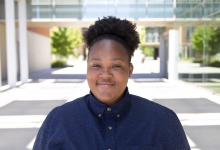 |
Major: Global Arts Studies Program (GASP)
Home City: Vallejo, CA
Contact: bfoster3@ucmerced.edu
Faculty Mentor: Jayson Beaster-Jones
|
Brijeanae "Bri" Foster is currently an uprising fifth-year undergraduate student that comes from the Bay Area. Originally growing up in Vallejo, CA, to now residing in Merced attending the UC, Brijeanae hopes to make changes within communities similar to that in which she grew up through the use of multimedia. Just recently returning from a year abroad in Prague, Czech Republic, studying media and film, Brijeanae strives to incorporate many concepts and theories from the Czech perspective to use them in her future works. Upon returning to the United States Brijeanae plans to spend her spare time outside of UROC-H working to create new projects that depict life as a first-generation student college from low-income communities. Graduating Spring 2020, Brijeanae's end goal is to contribute to low-income communities by creating works that inspire a life of higher education along with world travel that broaden one's understanding of the world we share.
Music Memory Hours: Sympathy In and Out of Minority Communities
Brijeanae D. Foster, and Jayson B. Jones, PhD; School of Social Sciences, Humanities, and Arts, University of California, Merced
Music Memory Hours (MMH) are an ongoing research study on music-evoked remembering and mental health. The Beaster-Jones Lab at UC Merced, along with the Janita Lab at the Center for Mind and Brain at UC Davis, have been holding MMH in group and individual settings. They are conducted to observe the uniqueness of the human brain and how it reintroduces past events and memories by the significance of a particular melody or song. Idiosyncratic memories buried deep within the brain can resurface with MMH. By invoking these memories, the opportunity to analyze correlations between music and an individual’s capacity to sympathize both in and out of minority communities is achievable. Taking a closer look at the growing city of Merced and communities within, MMH can essentially divulge differentiations among said communities. Music Memory Hours held with local Merced natives of over 10 years, have assisted in understanding the dynamics within these communities. Specific music and unique memories associated with that music affect how one actively learns to sympathize outside of their identified community. This study focused on middle aged participants of Merced. Understanding the way Merced community members have interacted with music throughout their lifespan with MMH, aided in discovering what minority communities they sympathize with.
Beatriz Hernandez
Beatriz Hernandez is a fifth-year undergraduate student from Sacramento, California. Expected to graduate in December 2019 with a BA in Sociology, and plans to apply to graduate school this fall semester. During her time at the University of California, Merced she established the first Animal Rights organization on campus, landed an internship with Building Healthy Communities in Sacramento, joined Kappa Delta Chi, Sorority Inc. a service-based sorority and she is currently campus representative for PETA. This summer, she is part of the UROC-H program and hopes to use her research to advocate for families that are being separated by deportation. Her work and experiences during her undergraduate career have ignited her interest for animal rights and human rights. Her ultimate goal is to establish her own non-profit organization/business with the goal of advocating for all animals, the environment, and human rights. Outside of academia, she enjoys visiting different vegan restaurants and cooking new recipes.
The Effects of a Parent's Deportation on College Students from Different Immigration Statuses
Beatriz Hernandez, and Tanya Golash-Boza, PhD; School of Social Sciences, Humanities, and Arts, University of California, Merced
The United States deportation system has been a threat to Latino immigrants for decades. Despite the large number of Latino families separated by the deportation system, there is still a gap in research on the effects of deportation on family members. This study focuses on how the immigration status of family members shapes their experience of the deportation of their parent. A total of five interviews were conducted with college students from California who were either undocumented, DACA recipients or U.S. citizens who had a parent deported. Analysis of these interviews reveal similarities and differences on the experience of immigration enforcement, financial difficulties and family relationships. Results show that deportation is not a single narrative which may help reconstruct services that best reflect the needs of each family.
Jessica Hernandez
Jessica Hernandez is an upcoming third-year undergraduate student at the University of California, Merced. She will be graduating Spring of 2021 with a Bachelor of Arts in Public Health. Currently, Jessica holds a leadership position in an on-campus organization known as Global Medical Training, she is an active member of Delta Epsilon Mu, and is a student assistant worker on campus. To destress, Jessica finds herself watching YouTube videos, taking road trips, and resting. In the future, Jessica aspires to attend graduate school and obtain a Master’s or Ph.D. in Health Administration. Her ultimate goal is to be able to give back to her community back home, in Merced, and ultimately to give back to her parents who have helped her throughout her academic and personal career.
General Comparison of the Nutrition Environment around Three Churches in South Los Angeles: A Qualitative Study
Jessica A. Hernandez, and Denise Payán, PhD; School of Social Sciences, Humanities, and Arts, University of California, Merced
Food environments refer to aspects of a person’s surroundings, which ultimately influence one's diet. Aspects that may influence a person’s diet include the way media portrays food or a certain lifestyle and physical locations such as schools, workplaces, and restaurants. Generally, low-income neighborhoods suffer from limited access to affordable, healthy foods and the tools that contribute to an active lifestyle. A general comparison on the nutrition environment, within a half-mile radius, around three churches in South Los Angeles were analyzed using data collected from 2015-2016. The data was collected through the Geographical Information System (GIS) tool, a mapping system that examines neighborhoods and their retail food availability, as well as the Communities of Excellence in Nutrition, Physical Activity and Obesity Prevention (CX3) tool, which collects and measures the quality, availability, and affordability of food on a neighborhood-level. This study revealed these three neighborhoods faced many challenges when it came to their nutrition environment. The nutrition environments in these neighborhoods are faced with unhealthy food options, very few supermarkets, and an abundance of fast-food restaurants and convenience stores. With limited access to healthy foods, there are numerous solutions on how to improve the quality of food within each environment. A healthy food environment not only contains healthy food choices, but it also promotes healthy lifestyles, includes adequate transportation, educates the community on health-food choices, includes healthy advertising, and limits the tempting media coverage of unhealthy foods/lifestyles.
Anaise Jimenez
Anaise Jimenez is a fourth-year undergraduate student from Merced, CA. She is expected to graduate in Fall 2019 with a bachelor’s degree in Psychology. Anaise hopes to leave a lasting impact on the youth of Merced county through after school education where she currently works as the coordinator of the after school program of a local elementary school. In her spare time, she enjoys baking, bike riding, and spinning records. Anaise aims to receive a teaching credential in special education and master’s degree in educational administration. Her main goal is to create positive social changes through policies that advocate for the wellness of children.
Gateway to Merced: Growing up in a Town with "Nothing to Do"
Anaise S. Jimenez, and Jayson Beaster-Jones, PhD; School of Social Sciences, Humanities, and Arts, University of California, Merced
The Gateway to Merced project aims to create access for community participation in the retelling of Merced’s history not as a quick stop off the highway but as a place to call home. My project places emphasis on the processes of community engagement to facilitate multiple narratives, specifically based on individuals’ experiences as adolescents growing up in a town with “nothing to do”. Using ethnographic data, oral histories, and Musical Memory Hours in which participants are played music from their past and asked to share their memories that the music elicits, this project is designed to build and strengthen the ties between the university and the various communities of Merced through engagement with lifelong residents and their histories. Through this project, I anticipate we will have a greater understanding of how adolescents growing up in Merced created spaces for themselves when there were none.
Madelyn Lara
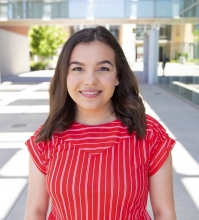 |
Major: History
Home City: Bakersfield, CA
Contact: mlara34@ucmerced.edu
Faculty Mentor: David Torres-Rouff
|
Madelyn Lara is a second year undergraduate student at UC Merced from Bakersfield, CA. She is expected to graduate in Spring 2022 with her BA in History. Madelyn is an active member of the Democrats Club as well as an editor of The Undergraduate History Journal at UC Merced. She has a passion for musical theater, and when she is not on campus she can often be found at Playhouse Merced where she recently played “Beth” in Little Women. Madelyn hopes to pursue a career in law or politics and is grateful that UROC-H will give her the opportunity to understand more deeply the history of policy and public opinion in regards to race relations, all of which will greatly help with her career aspirations.
Chinatown Declared a Nuisance: Merced, California
Madelyn Lara, and David Torres-Rouff, PhD; School of Social Sciences, Humanities, and Arts, University of California, Merced
In 1884, Merced established a Board of Health that sought to address the town’s health concerns. This measure comes at a time when much of the white population viewed Merced’s Chinatown to be a drain on their city, that would otherwise be thriving. The creation of a public health crisis was a well-documented anti-Chinese tactic in San Francisco, a hub of Chinese population and culture. In 1880, San Francisco Mayor Isaac Kalloch declared the city’s Chinatown to be a nuisance, deeming it a threat to public health. Earlier in the century, San Francisco’s Board of Health passed an anti-Chinese piece of legislation known as the Cubic-Air Ordinance, designed to break up Chinese tenement houses that were often, out of necessity, wildly overcrowded. However, the prevalence of anti-Chinese ordinances such as these are not so clearly defined in places where Chinese history in general has not yet been fully illuminated, Merced being one of them. Using newspapers published in Merced from the 1870s to the early 20th century, as well as minutes from Merced’s Board of Supervisors and Board of Health, this project seeks to understand the role that local government and news media played the notion that Chinatown was a danger to Merced. The establishment of a Board of Health, similar to that of San Francisco’s, indicate the strong possibility of local anti-Chinese legislation having been established.
Sarah Lee
 |
Major: History
Home City: Fresno, CA
Contact: slee424@ucmerced.edu
Faculty Mentor: David Torres-Rouff
|
Sarah Lee is a fourth year undergraduate History major and American Studies minor from Fresno, California. She received her Associates of Arts in History from Fresno City College with Highest Honors before transferring to the University of California, Merced, where she expects to graduate in Spring 2020. Her research, located in the 19thCentury American West, centers around how capitalism imposes ideologies of race, gender, class, and sexuality through space and place and how people resist through making their own spaces. On campus, she is the Chief Editor of the Undergraduate Historical Journal at UC Merced, a student run peer reviewed academic journal, and is active in the Transfer, Returning, and Veteran Program. When she’s not in class, she loves to do puzzles while listening to podcasts or watching TV with friends. After leaving UC Merced, she intends to pursue a PhD in History and teach at a research institution to serve first generation and underrepresented students in order to further diversify the academy.
Protecting Bounded Spaces: Differentiated Policing in 19th Century Merced, California
Sarah Lee, and David Torres-Rouff, PhD; School of Social Sciences, Humanities, and Arts, University of California, Merced
Towards the latter part of the 19th Century, the community of Merced, California became a site of transnational tensions over space. Anglo American imagined conceptions of place, saturated in Gilded Age morality, nascent capitalism, and republican ideals, clashed with a polyglot community vying for access to public space through independent businesses and autonomous ethnic enclaves. In order to facilitate a land boom, white residents attempted to inscribe their abstract expectations of the white, male West onto the cartesian space of Merced’s Main Street by constructing a crisis of criminality that justified constant police raids. The police, as mobile arbiters of public space, instituted a regime of territorialization, or concrete boundaries regulating specific behaviors in certain spaces. They both enforced social control over Chinese and Mexicans, and ensured that all Mercedians conformed to strict behaviors of white, middle-class people. By exploring the rhetoric in several late 19th Century Merced county newspapers concerning differentiated policing, this research locates Merced in the larger project of integrating the American West into the nation by reshaping Western cities into a facsimile of Eastern urban expression, adapted to meet the pressures of a polyglot community. The result is a socially produced space, facilitated by differentiated policing, shaped by a dialogue between imagined place and implemented territory, that established anew the cultural and political supremacy of whiteness over Otherness.
Connie Liu
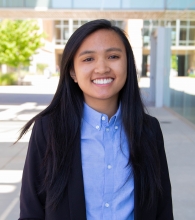 |
Major: Sociology
Home City: San Francisco, CA
Contact: cliu78@ucmerced.edu
Faculty Mentor: Tanya Golash-Boza
|
Connie Liu is a fourth year undergraduate student from San Francisco, CA. She is expected to graduate Spring of 2020, with a BA in Sociology. Connie has been involved with the LGBTQ+ community as the President of Lambda Alliance, the only LGBTQ+ undergraduate program at UC Merced. Connie has dedicated her college career to creating safe spaces that uplifts and supports the queer and trans people at UC Merced through educational and social programs. She is also a Prevention Intern at the CARE Office, where she aims to end gender-based violence through prevention-based programs. Connie believes that education is important to create a more equitable society that is free of violence because everyone deserves to live in a society where they can thrive as their authentic selves. Connie’s goal is to get a PhD in Education and to empower young people of color. She hopes to create educational institutions that value and uplift the dignity, livelihood, and experiences of marginalized communities.
Incarceration in the Central Valley and the Impacts on Women of Color in the Household
Connie Liu, Yajaira Ceciliano Navarro, MA, and Tanya Golash-Boza, PhD; School of Social Sciences, Humanities, and Arts, University of California, Merced
Research shows that incarceration creates financial, emotional, and social burdens on children and partners of incarcerated individuals. This research project focuses on how the incarceration of a family member impacts women’s role in the household. Five interviews were conducted with women of color in the Central Valley who have an immediate family member currently or formerly incarcerated on their experiences throughout the incarceration. The interviews reveal that incarceration of a family member often impact women’s geographic movement, aspirations, financial and caretaking responsibilities. These findings suggest that incarceration shift household roles, often resulting in women having to take on multiple responsibilities in order to provide for their family.
Darlene Medrano
Darlene Medrano is a fourth-year undergraduate transfer student from Long Beach City College. Expected to graduate in Spring 2020 with a BA in Economics and plans to start grad school the following fall. Darlene plans to complete a Masters in Public Policy in order to make policy changes for underrepresented families and continue advocating for parenting students pursuing degrees in higher education. She works on campus as the Womxn’s Program Intern and the Transfer Returning and Veterans Program (TRV) Intern, and is a Transfer Returning and Veteran program (TRV) scholar. Before attending UC Merced, Darlene completed the honors program in Long Beach City College earned an AA in Social Sciences as the Vice President of the feminist Club and President of the LBCC Parenting Students Club. She enjoys spending her free time with her son, partner, and two dogs.
Gendering the Workforce
Darlene G. Medrano, and Rowena Gray, PhD; School of Social Sciences, Humanities, and Arts, University of California, Merced
The history of women’s job titles and their gender roles within the workforce is significant to understand because this research explains how women got to be in the positions they are today. White women joined the workforce in large numbers during WW2 and retained their positions postwar. It is critical to acknowledge the occupational path of African American women during and after WW2 because their occupations changed from the service to the clerical industry. The literature of the history of women in the workforce was analyzed and illustrated that the critical positions of all women were in the blue collar and clerical industry. The textual analysis of the articles was compared to the data analysis from the census for 1940, 50, 60, 70. The job titles were then defined by the primary source of the Dictionary of Job Titles. It was concluded that women’s job titles and descriptions were different to men. Men were not negatively impacted by the increase of women in the workforce during and after the war. Women’s gender role in the workforce was in lower skilled positions and men were in higher skilled positions. The workplace for women was desegregated by race but was segregated by gender and the gender pay gap was wide. The gender roles placed post war set the stage for a long battle of gender segregation in the workforce.
Iven Morales
Iven Morales is a dedicated student from East Los Angeles, California. He is a rising third year undergraduate student and is expected to graduate with a BA in the spring of 2021. As a Political Science major, Iven has written many academic essays on ethnic minorities and their struggle with racial discrimination. He has shown his commitment to the University and his academic career, as he currently has a 3.8 overall GPA. Iven will apply to graduate school and work towards a PhD in Political Science. After graduate school, Iven wants to give back to his Salvadorean community and help underprivileged kids obtain a higher education. Overall, Iven wants to stick to his roots and specifically help impoverished individuals in Central America.
Health Disparities Amongst the Latino Community
Iven Morales, and Ma Vang, PhD; School of Social Sciences, Humanities, and Arts, University of California, Merced
Within the field of medicine and health, it is crucial to acknowledge the existence of health disparities within the United States’ healthcare system. Many underprivileged communities, such as the latinx population, have experienced severe cases of inadequate treatment within many healthcare facilities. In attempt to access proper health care, research indicates that many latinx individuals experience certain financial, linguistic, and cultural barriers. While conducting this mixed methods literature review, there are very few articles which discuss the qualitative content needed for this project. As a result, an oral history was performed where latinx families were asked to share their personal experiences about their battles for proper healthcare. This project will interview a total number of six individuals divided into three different families. Our research hopes to voice the stories of those who can not share their personal experiences with the community. We desire to engage with our interviewees and share their personal hardships in accessing high quality health maintenance. These interviews further help individuals like myself to propose possible solutions to this healthcare problem. In order to decrease the amount of health disparities within the healthcare system, the national government must establish cultural competence programs which informs doctors about racial discrimination in the health industry, provide affordable healthcare for all individuals including documented and undocumented, and finally increasing the diversity of doctors within healthcare institutions.
Maria Nguyen-Cruz
Maria Nguyen-Cruz is a fourth year English major with a creative writing minor who plans on graduating in the spring of 2020. An active member of the English major community, she frequently meets with and assists other English majors with producing quality content and fostering a sense of pride about the subject. This year, Maria has the privilege of being an editor for the Undergraduate Historical Journal at UC Merced and is the only English major on staff. She has also published a set of poetry in the fifth volume and first issue of The Vernal Pool, an undergraduate run literary journal at UC Merced, and assisted two graduate humanities students with transcriptions and research. Though passionate about writing, Maria is a performer at heart—she recently played Touchstone in this year’s performance of Shakespeare in Yosemite and was an avid musical theatre performer before she entered college. Maria’s hopes and dreams are to get into grad school, meet Mitski Miyawaki, go to therapy, and teach others to see literary analysis not as a chore—but as playing with works of art. Not necessarily in that order.
Social Justice Bard: Grassroots Shakespeare as Activism
Maria A. Nguyen-Cruz, and Katherine S. Brokaw, PhD; School of Social Sciences, Humanities, and Arts, University of California, Merced
Community-based grassroots Shakespeare is a new term and uncharted territory amongst Shakespeare and theatre scholars. Yet, these grassroots Shakespearean productions happen all over the world—so they are by no means a recent phenomenon. In this country, local productions of William Shakespeare’s work wove themselves into the hearts of the American people. Today, national efforts to spread awareness about the political and biological landscape are pervasive and there are community driven uses of theater to counteract hatred, divisiveness, and alt-right politics happening nationwide. This essay argues that modern day grassroots Shakespearean productions function as anti-fascist activism. The methods used to come to this conclusion come from practice as research (my own work as a performer in a grassroots Shakespeare production), social scientific analysis of audience surveys, and theories from the growing academic field of applied theatre/community practice. Whether the nature of the social commentary is eco-critical or political, localizing these issues and demonstrating the need for progressive movements not only informs the community but also strengthens the bonds amongst them, thus fighting fascism. By investigating the effectiveness of grassroots Shakespeare with progressive directing, I demonstrate that community-based, socially aware artistic choices in contemporary Shakespeare productions help to localize political movements.
Rosa Reyna Secaida
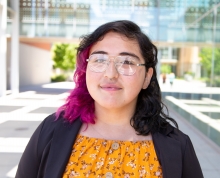 |
Major: Global Arts Studies Program
Home City: Van Nuys, CA
Contact: rreynasecaida@ucmerced.edu
Faculty Mentor: Jayson Beaster-Jones
|
Rosa Reyna Secaida is a third year undergraduate student from Van Nuys, CA. Expected to graduate in Spring 2021 with a BA in Global Arts Studies, Rosa has already begun to make her mark at the University of California, Merced by starting to conduct research and being an active community volunteer. As an employee at the Community Engagement Center, Rosa thinks it is important to give back to her community by volunteering her time, and helping students integrate and become part of the Merced community. To destress, Rosa finds herself painting and playing covers to her favorite songs. She aspires to achieve an MA in Art Therapy, and her ultimate goal is to be an active spokesperson talking openly about mental health and help terminate the stigma surrounding mental illness. She wants to provide resources and education on mental health to underprivileged communities and help youth face their mental health realities by providing the opportunity to create art.
Children of Latinx Immigrants: Music Binding Two Cultures
Rosa Isela Reyna Secaida, and Jayson Beaster-Jones, PhD; School of Social Sciences, Humanities, and Arts, University of California, Merced
Music-evoked remembering has been proven to be an intriguing and helpful mental health procedure. Such procedure can be used to explore the relationship between music, cultures, and identity. Through the conducting of music memory hours, a connection between music and the integration of two cultures was revealed in children of immigrants. Participants expressed feelings of being torn between two cultures, being told they are not “American” enough or “Latino” enough. Music helped in binding both of their cultures, mostly through language. Speaking Spanish is an important marker of identity and is vital to music representing and creating a hybrid culture. I interviewed children of Latinx immigrants and performed Music Memory Hours. Music Memory Hours consist of semi-structured interviews with questions gathering information on culture and identity followed by playing music and discussing associated memories. fMy data revealed a connection between music, the participants cultures, and identity. Participants stated having two cultures; inheriting their parents’ cultures and being born in America. They described music as holding memories and bringing them back to their culture while connecting them to their parents’ stories and homelands. Participants also suggested that any music connects any two cultures. The interviews revealed that music brings two cultures together and expresses individuals’ identities.
Fabian Rocha
 |
Major: Sociology
Home City: Watsonville, CA
Contact: frocha3@ucmerced.edu
Faculty Mentor: Tanya Golash-Boza
|
Fabian Rocha is a third year undergraduate student from a small agricultural town Watsonville, CA. Expected to graduate in Spring 2021 with a BA in Sociology, Fabian has been working on building his legacy at University of California, Merced by conducting research with UROC-H, being an active member in multiple clubs on campus, and volunteering in the community. As the VP of Communications in the club Generation to Generation and a member of the Peer Review Board, Fabian has learned the importance of volunteering in the community. His hobbies include playing sports, having a great time with family and friends, traveling, and going to concerts. He aspires to achieve a PhD, however he is not sure in what yet. His ultimate goal is to be able to inspire others, especially the youth that come from a similar background as his own to strive for a higher education.
The Impact of Deportation on Family Dynamics and their Mental Health
Fabian Rocha, and Tanya Golash-Boza, PhD; School of Social Sciences, Humanities, and Arts, University of California, Merced
U.S immigration policies that conclude with deportation result in negative consequences for undocumented and mixed-status families. These consequences vary from impoverishment, depression, stress, and constant fear of the possibility of being deported. The deportation of a family member can drastically impact children as well as the entire family dynamic. Five interviews were conducted on people from different families who have had a family member deported or are in the process of being deported. The change in family dynamic before and after the deportation of a family member is analyzed including how it affected them, and the social resources they have utilized through this process. The results have shown that indeed, the deportation of a family member negatively impacts the family emotionally and financially. This often leads to mental health help. Mental health includes stress and depression which can often lead to mental health clinic visits and gang involvement. With this being said, the results obtained will be used to show that changes to immigration policies are necessary because not only are they resulting in family separation, but jeopardizing the well being of family members.
Jacqueline Sernas
 |
Major: Sociology & Psychology
Home City: Lancaster, CA
Contact: jsernas@ucmerced.edu
Faculty Mentor: Tanya Golash-Boza
|
Jacqueline Sernas is a fourth year undergraduate student at the University of California, Merced. She is expected to graduate in the Spring of 2020 with a BA in Sociology and Psychology. Her interests are around uplifting communities and individuals who have been marginalized and disadvantaged and hopes to give rise to voices that remain unheard. During her time at UC Merced she was able to get involved in the Merced community as an intern for a non-profit organization, Communities for a New California, which provided local mobilization and outreach to South Merced. Currently, she is a Marketing and Food Security Intern at CropMobster, which aims at fighting food insecurity and food waste among its students and residents in Merced County. On campus she is involved in Kappa Delta Chi Sorority Inc. and holds an executive position. Jacqueline will continue to aspire for higher education and is hopeful in attending graduate school in the near future.
Incarceration and the Hidden Impacts: Family Experiences
Jacqueline Sernas, and Tanya Golash-Boza, PhD; School of Social Sciences, Humanities, and Arts, University of California, Merced
The consequences that incarceration has on an individual goes beyond their sentencing. Because of this, they not only leave behind their family, but they also extend the hidden impacts that then becomes a barrier for the family member’s lives. To further understand the hidden impacts of these individuals, I conducted five in-depth interviews of personal experiences in dealing with an incarcerated loved one and analyzed the coded data to find common themes that were shared among the interviewees. As a result, some the common themes varied from stigmatization to emotional stress that were faced among family members. Furthermore, these experiences highlight the complexity behind how incarcerated family members are able to succeed in integrating back into society and how much support they receive.
Stephanie Soto Rodriguez
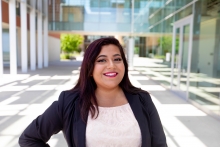 |
Major: Psychology
Home City: San Diego, CA
Contact: ssoto25@ucmerced.edu
Faculty Mentor: Tanya Golash-Boza
|
Stephanie is a third year undergraduate from San Diego, CA. Expected to graduate in Spring 2021 with a B.A in Psychology, Stephanie has begun to make her mark at the University of California, Merced by conducting research and being an active member in her community. As the Secretary for Lambda Theta Nu Sorority, Inc. and employment as a Lead Scholar for Fiat Lux, Stephanie believes in the importance of opening doors for first generation college students, aiming to be a voice for those who are oppressed and underrepresented. During her free time, Stephanie enjoys hanging out with friends, going on adventures, and dancing the night away. She aspires to attend graduate school and obtain a PhD in Psychology.
The Shaping of a Stigma, Collateral Consequences of Incarceration on Young Adults
Stephanie Soto Rodriguez, and Tanya Golash-Boza, PhD; School of Social Sciences, Humanities, and Arts, University of California, Merced
Impoverished families in the Central Valley have been succumbed to torment and agony due to the alarming number of incarcerations California has endured. This study will examine the impact incarceration has on young adults when a family member has been arrested. Most studies on incarceration have sought out to focus mainly on the negative effects incarceration has on young adults. This study will be focusing on how incarceration molds young adult’s thoughts and actions, which leave a lasting impact on their life. A total of five, thirty to fifty minute interviews were conducted with individuals who currently live in the Central Valley. It was revealed that incarceration was perceived as normal amongst those affected. Resilience was developed through their relationships with their friends and family and through these, dreams of pursuing a higher education were made to defy what was expected of them. These findings will be used to emphasize the positive effects incarceration has had on young adults.
Ariell Wright
 |
Major: Critical Race and Ethnic Studies
Home City: West Sacramento, CA
Contact: awright26@ucmerced.edu
Faculty Mentor: Ma Vang
|
Ariell Wright is an incoming fourth year undergraduate student from West Sacramento, CA. Expected to graduate Fall 2020 with a BA in Critical Race and Ethnic Studies with a minor in Political Science, Ariell has been active in the University of California, Merced community since their arrival. Ariell finds passion in their community, advocating often for the LGBTQ+ community at UC Merced. Having sat on the Chancellor's Advisory Committee on Queer Issues (CACQI), Gender Inclusive Facilities Board, LGBTQ+ Center Advisory Board, as former Vice President of Lambda Alliance, advocate for Gender Inclusive Housing, and current LGBTQ+ Initiatives Intern, Ariell has come to realize that research is a crucial tool for advocacy. Without research to support advocacy, doors close quickly and often. Ariell has seen this first-hand, and has chosen a career path with hopes of creating such research. Ariell aspires to achieve a PhD in race and ethnic studies, humanities, or a similar interdisciplinary program. Their ultimate goal is to advocate for communities through their education and career, and inspire others to do the same.
Gender Expression and Violence in Merced, CA
Ariell A. Wright, and Ma Vang, PhD; School of Social Sciences, Humanities, and Arts, University of California, Merced
Gender expression is a spectrum between two binaries: feminine and masculine. This expression can be through clothing, hairstyle, speech, mannerisms, etc. and is a way to express one’s true self. For many, the choice to be their true self can lead to violence based on their perceived gender identity. The U.S. has recently seen a significant increase in murders and harassment of transgender women of color, based on their perceived gender expression. In more conservative cities such as Merced, this identity-based violence is a threat one learns to navigate throughout life, and one may develop means to try to avoid this harm. In conducting a one-hour interview with adult participants who identify their gender expression outside the binary and live in Merced for over three months since 2009, this study observes the avoidance tactics used to survive a potentially hostile environment. The goal of this study is to understand the relationship between those who express their gender outside binary expressions, and the violence they risk facing in public. The hypothesis of this study is that those who identify their expressions outside of the binary will either take steps to alter themselves to avoid violence, or avoid certain areas that violence may occur. Findings suggest people in Merced are not free to be their true selves without fear of violence.


